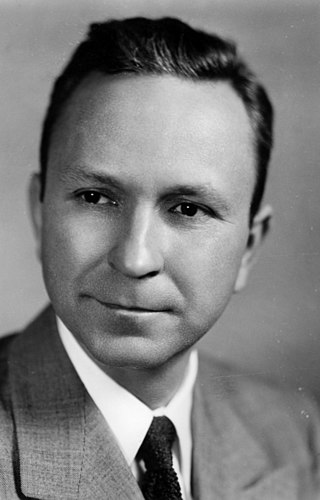Top Qs
Timeline
Chat
Perspective
J. Caleb Boggs
American politician (1909–1993) From Wikipedia, the free encyclopedia
Remove ads
James Caleb Boggs (May 15, 1909 – March 26, 1993) was an American lawyer and politician from Claymont, Delaware. A Republican, he was commonly known by his middle name, Caleb, frequently shortened to Cale.[1]
This article includes a list of general references, but it lacks sufficient corresponding inline citations. (November 2010) |
Remove ads
He was a veteran of World War II, and a member of the Republican Party, who served three terms as U.S. Representative from Delaware, two terms as Governor of Delaware, and two terms as U.S. Senator from Delaware. He lost re-election in 1972 to then–New Castle County councilman and future President of the United States Joe Biden.
Remove ads
Early life and education
Boggs was born on May 15, 1909, at Cheswold, Delaware,[2] the son of Edgar Jefferson and Lettie Vaughn Boggs. Boggs joined the Delaware National Guard in 1926 and became a reserve officer that year.[2]
Family
In 1931, he married Elizabeth Muir; the couple had two children, and were members of the Methodist Church.[3]
Education
He graduated from the University of Delaware in 1931 with an A.B. degree[4] and later graduated from Georgetown Law School in 1937[2] with an LLB degree.[2]
Remove ads
Career
Summarize
Perspective
In 1938, he was admitted to the Delaware State Bar Association and began the practice of law at Dover, Delaware.[2]
During World War II, he served in the U.S. Army with the 6th Armored Division fighting in Normandy, the Rhineland, the Ardennes, and central Europe. He earned five Campaign Stars, the Legion of Merit, the Bronze Star Medal with Oak Leaf Cluster, and the Croix de Guerre with palm from France.[3]
U.S. House of Representatives
Boggs was appointed Associate Judge of the Family Court of New Castle County in 1946. He was elected to the U.S. House of Representatives in 1946, defeating incumbent Democratic U.S. Representative Philip A. Traynor. He won the election a total of three times, also defeating Democrats J. Carl McGuigan in 1948, and Henry M. Winchester in 1950. Boggs served in the U.S. House from January 3, 1947, to January 3, 1953.
Governor of Delaware

Boggs was elected Governor of Delaware in 1952, defeating incumbent Democratic Governor Elbert N. Carvel by 7,205 votes. he won a second term in 1956, defeating Democrat J. H. Tyler McConnell by 6,918 votes. He served as governor from January 20, 1953, to December 30, 1960, when he resigned because of his upcoming U.S. Senate term. As Governor Boggs restructured governmental agencies, and endorsed the merging of school districts and Increasing teachers’ salaries. a prominent issue of his tenure was school desegregation, he was a proponent of the municipal home rule. On April 2, 1958, he signed the bill that ended capital punishment in Delaware.[5]
United States Senator

Boggs was elected to the U.S. Senate in 1960, narrowly defeating incumbent Democratic U.S. Senator J. Allen Frear Jr. by 2,784 votes, and becoming the only Republican to defeat an incumbent Democratic U.S. Senator that year. He was again elected to the U.S. Senate in 1966, defeating Democrat James M. Tunnell Jr., son of a former U. S. Senator by 30,005 votes. He served two terms from January 3, 1961, to January 3, 1973. Boggs voted in favor of the Civil Rights Acts of 1964 and 1968,[6][7] as well as the 24th Amendment to the U.S. Constitution,[8] the Voting Rights Act of 1965,[9] and the confirmation of Thurgood Marshall to the U.S. Supreme Court.[10]
Boggs lost his bid for a third term in 1972 to the future 47th Vice President and 46th President, Democrat Joe Biden, then a New Castle County councilman. Boggs was a reluctant candidate that year, being persuaded to run only to help avoid a divisive primary election.[11] Biden waged an energetic campaign, questioning Boggs's age and ability, and went on to defeat Boggs by 3,162 votes.[12] In his last years, Boggs lived in Wilmington, Delaware, where he continued to practice law until retiring in the early 1980s.[3]
Remove ads
Death and legacy
Boggs' health declined in his final years due to diabetes and cancer. His wife, Elizabeth, died on April 1, 1992, and he died just under a year later, on March 26, 1993, at Christiana Hospital in Newark, Delaware.[3] He is buried in the Old Presbyterian Cemetery in Dover, on the grounds of the Delaware State Museum.
The J. Caleb Boggs Federal Building at 844 King Street in Wilmington, Delaware is named for him.
List of General Assembly sessions
Remove ads
Elections
Remove ads
References
Bibliography
Images
External links
Wikiwand - on
Seamless Wikipedia browsing. On steroids.
Remove ads

